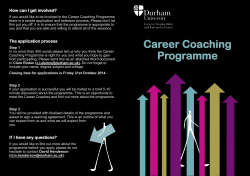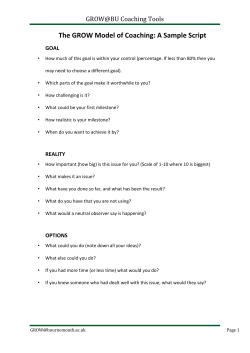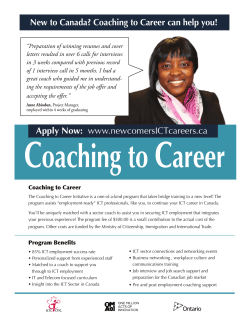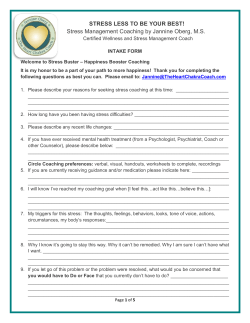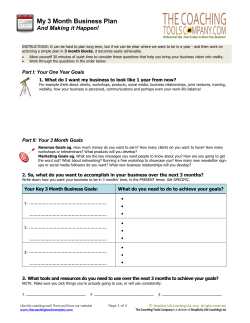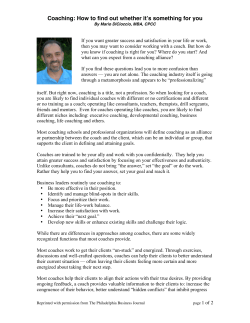
A How to Reinvent Your Career
May/June 2009 A Newsletter of PersoNAl ANd ProfessioNAl Growth from JohN e. loNG, ms, GCdf, CPCC How to Reinvent Your Career John E. Long Career Coach John is a Global Career Development Facilitator and Professional Career Coach. He works with a broad range of clients seeking assistance with career exploration, career development and career transition. John has specialty training in the interpretation of personality and career assessments, such as the MBTI®, Strong® and WPi®. He also focuses on worklife balance, time and stress management, and examining life roles. John offers customized services to identify what motivates each client and to clarify aspirations the client can pursue with passion. Coaching is about support, encouragement, and action to meet the client’s needs and achieve meaningful results. A re you an employee, entrepreneur or manager who suddenly finds it necessary to reinvent your career due to the economy, a layoff or going out of business? Or, do these uncertain times simply inspire you to make a change? If so, you may wonder if you can make a fresh start without having to start over. The good news is, you can. Here’s how: Say “Yes” to Everything Inventory Your Passions way to find out is to experiment. Volunteer, job shadow, temp or take part-time work in a field you’ve always been curious about as a career. The best place to start is to follow whatever you’re drawn to—trust your instincts. Contact John for a complimentary phone consultation. Phone: 404-277-0776 Exploretworoads@att.net www.Exploretworoads.com Transferable Skills Instead of starting something entirely new, you can start by building on what you already know/have done. From accountant try a transition into financial Feel Your Feelings... planning; from teacher to social worker; from real Get angry or frustrated or confused or scared or excitestate agent to tour guide, etc. If it worked for you in ed.... It’s natural and healthy. No need for the stiff upper the past, it could serve you well now. lip. Also no need to deny any enthusiasm. Respect your The Secret to Reinvention feelings, and then move forward. Don’t know what to “change into?” That’s okay. The only Ask yourself (or someone you trust): What do I like about me? What do I do better than anyone else? What do I own or use that makes me unique, whether it’s the tone of my voice or jazz collection or...? The Value of Values Find Support Having Strengths is Not Enough You’re not alone. There are always others in a similar position as you. This is no time to be isolated. Networking with others via job hunting groups, small-business groups and manager support networks leads to new opportunities. Letting people know you’re looking for work or customers is not begging, it’s marketing. Know your strengths, yes, AND remind work contacts and networking buddies where you excel. Be visible. How? Listen to and collaborate with others; share your ideas; if you’re working, participate in meetings and accept projects that highlight your skills. If it were impossible to fail, what career would you choose, today? Is it what you are doing now? If not, could this transition be the time to make a significant change? l Discovering what we value can be elusive especially under the influences of the “shoulds” from society and loved ones. It can help to ask yourself, what is most important to me? Security? Freedom? Independence? Money? SE R V I C E S OFFERED • Career Coaching • Executive Coaching • Interview Coaching • Outplacement Coaching • Testing & Assessment • Career Development • Talent Development • Training & Workshops Saying “yes” to all opportunities is a powerful expression of self-confidence. It attracts more (and better) opportunities and choices—you can always change your mind. Turn Lemons into Lemon Meringue Pie Ways to Make Personal Branding Work for You Billionaire Warren Buffet says that in a down economy your best asset is you. Funny, the same is true when the economy is up. Here are 10 ways to make personal branding work for you in any economy. 1. Think value. How can you create value for people, if you’re self-employed, or for your company? 2. Narrow your focus. Being known as a subject matter expert will get you known more quickly and more widely. 3. “Brand” everything you do. Whether it’s a presentation, a report or a product, stamp it with your touch, your “quality assurance.” 4. Invest in education. Developing and honing your skills keeps you on top of your game. 5. Step up. Think less about the way something is “always done” and more about the best way to do it. 6. Make it about them. Your personal brand is more powerful when built on the success you create for those around you. 7. Seek the wisdom and counsel of others. Hire a coach or seek a mentor to help you build a respected personal brand. 8. Differentiate. What is it about you that stands out in a crowd, whether on paper or in person? Know that. Use it wisely. 9. Keep in touch. Burn no bridges; better yet, maintain—and grow—a wide network of industry and other contacts. 10. Think of yourself as a business. Now go out and be head marketer for the brand called YOU. l 2 May/June 2009 Self-Quiz How Well Do You Cope with Financial Uncertainty? These roiling times can tip anyone’s boat, yet we have to find ways to cope. Take this quiz to see how well you are managing financial uncertainty. True False 1. I do my best to focus on the financial stability that exists in my life. It does me no good to obsessively worry about financial hits I’ve taken that I can’t do anything about. 2. It takes time to get used to diminished circumstances. I accept my feelings and give myself a break. 3. Fear plays a role in the stock market, and overly contracting as a consumer harms the economy. I invest and spend funds based on facts, not fear. 4. If I am suffering financially, I am facing the reality of my situation and taking appropriate steps to get back on top. 5. If I made questionable financial or business decisions, I acknowledged my responsibility, made any necessary amends or corrections, and moved on. 6. I don’t bury my head in the sand, but I keep my intake of bad news to a minimum. 7. When I feel anxiety, I talk to someone who doesn’t react to it—a peaceful friend or colleague who reminds me that contentment is possible. 8. I recognize that hard times breed efficiency and am taking the time to fix those inefficiencies I was putting off. 9. If I have unwanted downtime from work, I am using it well. I’m taking a class, brushing up my skills, pursuing creative projects or simply getting more rest. 10. I don’t rely on substitutes for good self-care, such as smoking, drinking, overeating or excessive TV/Internet viewing. 11. I discharge anxiety through exercise, or dissolve it with yoga or meditation. 12. To shift a bad mood, I seek healthy diversions, such as time with good friends or light-hearted movies. 13. I have plans for the future, both personally and professionally. Despite the economy, I’m confident I will thrive. 14. I seek the opportunities in today’s economic news. They are all around me; I have only to look. If you answered false more often than true you might want to consider how much it is costing you to buy into any financial uncertainty you’re facing. Please don’t hesitate to call if you’d like to discuss this further. l Relevant Reading A Manager’s Guide to Coaching: Simple and Effective Ways to Get the Best Out of Your Employees, by Brian Emerson and Anne Loehr Growing Your Company’s Leaders, by Robert M. Fulmer and Jay A. Conger The Three Laws of Performance: Rewriting the Future of Your Organization and Your Life, by Steve Zaffron & Dave Logan Results Through Relationships: Building Trust, Performance and Profit Through People, by Joe Takash “Courage is not the absence of fear, but rather the judgment that something else is more important than fear.” The Credible Company: Communicating with Today’s Skeptical Workforce, by Roger D’Aprix —Ambrose Redmoon “Motivation is when your dreams put on work clothes.” —Ben Franklin Used by permission © 2009 Claire Communications Emotional Intelligence for Managing Results in a Diverse World, by Lee Gardenswartz, Jorge Cherbosque & Anita Rowe May/June 2009 How to Give More Value “B uy one, get one free!” “You’ll ALSO receive these valuable bonuses!” “Order today and we’ll throw in another complete set of Ginsu knives, absolutely free!” The idea of added value is not new—those Ginsu ads from the 1970s are still a brilliant example of increasing the value of an offer to make it more attractive to the prospective customer. But, these days, value is more important than ever. What Value Means Today We all provide value in the workplace—either by the work we put in as an employee, or with the products and services we sell in our business. A good performance review may not be enough to guarantee a promotion or even to keep your job. Likewise, a high-quality product or service may not be enough on its own. Value is in the eye of the beholder (consider how much more you might pay for an umbrella on a rainy day). Workers who are easy to get along with and reliable with assignments will be more valuable to their manager than someone who creates stress in team meetings and regularly misses deadlines. Likewise, a product will be more valuable to a consumer if his or her favorite celebrity endorses it, if it’s on sale, or if it includes an added bonus. At the same time, we are becoming desensitized to advertising; we’ve become wary of bonus offers, upsells and additions. We’re looking for authenticity; THAT is what we value right now. Why Giving More Makes Sense Given the increased competition in the job market, workers have to demonstrate their value to the company in order to get and keep their jobs, as well as to move ahead to higher positions. Many consumers are feeling strapped and worried and are guarding their purchases carefully. On the other hand, we’re in the midst of a virtual flood of sales offers (no shortage there). Consumers are choosing the products and service they perceive to be the most valuable. You absolutely have to maximize the perceived value of what you offer. But you also need to support yourself and your family. So what do you do? Ways to Give More without Breaking the Bank–Owners/Managers • Look for things you can add on to your products and services that won’t cost you much but are still very valuable, e.g., a downloadable e-book or companion CD. • Approach someone who has a complimentary business that serves your market, and ask him or her to contribute an additional product or service. It’s a win-win, since they get the exposure to your customers or clients and you get the additional value for your offer. • Add to the perceived value of your product or service by including case studies and/or testimonials. Consider who might have the highest level of “social capital” for your audience. Generally this will be someone whom your prospects can relate to as having similar challenges and circumstances OR someone they admire for having achieved what they are trying to achieve. • When you consider ways to amp up the perceived value of what you offer, put yourself in your prospect’s shoes. Is there something about your product or service that you take for granted, but that others find valuable? If you’re not sure, survey satisfied customers and clients. Ways to Give More without Breaking the Bank–Workers • Workers, make yourself indispensable to your team by establishing yourself as a connector. Listen for things that people need and match them with people who have them. Of course, do this for work projects and other office tasks, but also extend it to personal issues. For example, if someone tells you about a great vacation spot, and someone else is planning their next trip, suggest that the two people chat about it. • Call attention to the added value you’re already giving to your organization. Perhaps you’re a typesetter who regularly catches editorial errors everyone else misses. Don’t just assume your supervisor will notice: point them out in a friendly note. In this crowded marketplace, competitive job market and challenging economy, there are opportunities for the cream to rise to the top. Make sure you remind people of your value; why YOU are the cream! l The following questions are designed to broaden perspectives, to open vistas, to widen the lens. There is no one right way to approach them. You can journal about them, talk to friends, create art, ponder them while driving or working out, dance them—whatever helps you explore “outside the box.” 1. What makes you unique? How could you better capitalize on that? 2. What are your five top values? The highest one? 3. What opportunities have you missed by not saying yes to them? 4. How could narrowing your focus expand your expertise? 5. Are you confident of thriving—no matter what? 6. What practice/good habit can you add to your life to support your wellbeing? 7. When did you last spend quality time with YOU? 8. What do you take for granted about your product or service? 9. What value do you provide that you allow to go unnoticed? 10. What one step could you take to maximize the value of what you offer? 11. Is happiness one of your goals? If not, why not? 12. What provides pleasure and meaning for you in your work? 13. How do you celebrate your successes? 3 4 May/June 2009 W Why Happiness Matters at Work hen you were little and the teacher asked you what you wanted to be when you grew up, bet you didn’t answer “miserable!” At every stage in life, unhappiness is not a state to which we aspire. But with the economy rolling downhill, our jobs and businesses can seem like tiny inflatable rafts in a big scary ocean of fear. So, we hold on. But what if we have a boss who’s overly demanding and doesn’t appreciate us? Or what if our worries about sustaining business are exhausting us to the point of burnout? Or what if we just feel gloomy and don’t know why? In unstable times, it’s especially hard to know what to do when we’re unhappy in our jobs and businesses. Happiness Matters We all have a natural capacity to derive pleasure and satisfaction from hard work. But reports from The Conference Board conclude that many of us are not happy at work. Medical evidence suggests being unhappy at work affects our memory and our capacity to learn, while increasing the risk of illness. On the flip side, happier people are more likely to: • make better team players and more effective leaders. • be more creative, confident and productive. • have a stronger network of allies. • require fewer days off. As if that wasn’t enough, here’s the clincher: happier people tend to be, well, happier. How to Find Happy Hour on the Job If thinking about cheerful people is making you envious, here’s the good news: we can all learn to be happier. In fact, the most popular class at Harvard University is one in which students learn to train their brains to cultivate what instructor Tal Ben-Shahar calls the ultimate currency: happiness. Here are some tips for training your brain for happiness at work: Celebrate success. Whether it’s the achievement of a major goal or another week where the laser printer ran smoothly, give yourself, your colleagues and your laser printer a pat on the back. Seek meaning. Happiness at work comes from doing something that gives us pleasure and meaning. If your job currently provides neither, make sure your day or week includes some engagement in activities that do. It could be a hobby or volunteering or taking a course. Or allowing time to read a book or cook something tasty. Think it. Happiness depends mostly upon our state of mind. It is not directly related to status or income. Express gratitude and be generous. Be grateful for everything that makes your day better, from a colleague’s smile to your morning latte. Make it a habit to be thoughtful towards others. Give out three free compliments a day! l —William Hazlitt, essayist (1778–1830) “If you think you can win, you can win. Faith is necessary to victory.” Phone: 404-277-0776 Email: Exploretworoads@att.net www.Exploretworoads.com Contact John today and discover the benefits of career coaching! John E. Long, MS, Gcdf, cpcc Career Coach Two Roads Resources, Inc. 922 Eden Avenue SE Atlanta, GA 30316
© Copyright 2025

